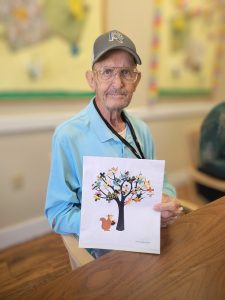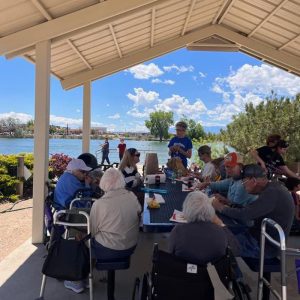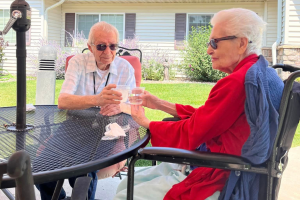Healthy aging for senior men involves adopting strategies that support physical, mental, and emotional well-being. As men age, they face unique health challenges, including higher rates of heart disease, prostate issues, and cognitive decline. However, with the right mindset and appropriate approach, senior men can lead fulfilling and healthier lives.
Unique Health Concerns Impacting Healthy Aging for Senior Men
 As men age, they encounter various challenges that can significantly impact their quality of life. According to the Centers of Disease Control and Prevention (CDC), the most common causes of death for men are heart disease and cancer, followed by unintentional injuries and chronic diseases such as diabetes, Alzheimer’s, and kidney disease.
As men age, they encounter various challenges that can significantly impact their quality of life. According to the Centers of Disease Control and Prevention (CDC), the most common causes of death for men are heart disease and cancer, followed by unintentional injuries and chronic diseases such as diabetes, Alzheimer’s, and kidney disease.
Understanding these health concerns – as well as the few below that are specific to men – is crucial for effective prevention and healthy aging for senior men.
1. Benign Prostatic Hypertrophy (BPH): Otherwise known as prostate gland enlargement, BPH is a common condition among senior men that leads to difficulties and discomfort with urination. The American Urological Association reports that about 50% of men aged 51-60 have BPH with numbers rising to nearly 90% for men over 80 years old. While there are many treatment options, many mild cases can effectively be managed through lifestyle changes, such as diet and exercise.
2. Prostate cancer: Excluding skin cancer, prostate cancer is the most prevalent cancer among men. Regular screening is key for early detection and with timely intervention, is often treatable.
3. Low Testosterone: Low testosterone affects many aging men and is characterized by a decline in sexual satisfaction, including reduced libido, sleep disturbances, irritability, and more. Making healthier lifestyle choices – such as managing stress, ensuring adequate sleep, and regular exercise – can help alleviate these symptoms.
4. Unintentional injuries and falls: These accidents, particularly falls, pose a significant risk for older adults. Men are twice as likely to die from such injuries compared to women, and falls are the most common cause of injury among men over 60. Utilizing technology, such as fall detection devices, can help reduce the risk of falls and ensure safety.
Understanding these unique health concerns is the first step, but awareness alone isn’t enough. The good news is that senior men can take proactive steps to maintain their independence, vitality, and overall well-being. By making intentional lifestyle choices, they can significantly reduce health risks, stay active, and enjoy a higher quality of life.
The following five essential steps offer a practical guide to healthy aging, helping senior men stay physically strong, mentally sharp, and socially connected.
5 Essential Steps for Healthy Aging in Senior Men
The following wellness strategies can help men (and women) lead longer, healthier, and more meaningful lives. Many of these are rooted in the five pillars of wellness that contribute to the approach to community life at Cappella of Pueblo West.
Physical Activity
Regular physical activity is crucial for maintaining overall health. Exercise improves cardiovascular fitness and enhances strength, flexibility, and balance. Engaging in activities like walking, swimming, or resistance training can significantly reduce the risk of chronic diseases and improve mental health.
At Cappella of Pueblo West, we prioritize the physical health and wellness of residents through programs and amenities. One particular initiative, the walking group, that encourages seniors to stay active through walking and structured movement routines tailored to various fitness levels.
Balanced Diet
A balanced diet plays a significant role in healthy aging for senior men. Consuming nutrient-dense foods rich in vitamins and minerals can help maintain health and vitality. Focus on incorporating plenty of fruits, vegetables, whole grains, lean proteins, and healthy fats. Additionally, men over 50 should ensure adequate intake of calcium and vitamin D to support bone health.
 Our Duet Dining team at Cappella of Pueblo West offers wholesome meal options that cater to individual dietary needs, ensuring that residents enjoy nutritious and delicious meals. With a menu for every palette, dining at Cappella Pueblo West promotes a strong culture of community that is built around shared meals and fulfilling experiences.
Our Duet Dining team at Cappella of Pueblo West offers wholesome meal options that cater to individual dietary needs, ensuring that residents enjoy nutritious and delicious meals. With a menu for every palette, dining at Cappella Pueblo West promotes a strong culture of community that is built around shared meals and fulfilling experiences.
Mental Stimulation
Keeping the mind active is just as important as physical health when it comes to overall cognitive fitness and healthy aging for senior men. Engaging in mentally stimulating activities such as puzzles, reading, or learning new skills, can help maintain cognitive function.
Social activities, like board games and community outings, provide both mental challenges and opportunities for connection. Studies show that cognitive fitness can significantly enhance quality of life. Explore some of our resources on cognitive fitness to find engaging activities that stimulate the mind and foster social interaction.
Social Connections

Social connection is vital for emotional health. Loneliness can rival smoking and obesity when it comes to health risk, making it essential to foster relationships with family, friends, and community members.
At Cappella of Pueblo West, we create a vibrant community through various social opportunities from volunteer work to game nights, encouraging men to engage and connect with others. It’s our belief that community life benefits overall health, but especially social and emotional health of aging men.
Regular Health Check-Ups
Regular health check-ups are essential for early detection and management of health issues, especially those that are distinct to men. Senior men should prioritize routine screenings, including prostate exams, colonoscopies, screening for abdominal aortic aneurysms, vaccinations, hearing and vision checks, and cholesterol and blood pressure checks.
Men are often reluctant to seek medical attention, which can lead to a late diagnosis of serious conditions. Staying proactive about healthy aging for senior men allows for timely interventions and better outcomes.
Don’t hesitate to discuss any health concerns with your doctor as early detection can make a significant difference.
Simple Steps for Significant Shifts Towards Healthy Aging in Senior Men
 By incorporating these five steps into daily life, senior men can navigate the challenges of aging while promoting independence, confidence, and their overall health and well-being. At Cappella of Pueblo West, we are dedicated to supporting our residents in achieving their wellness goals and living life to the fullest.
By incorporating these five steps into daily life, senior men can navigate the challenges of aging while promoting independence, confidence, and their overall health and well-being. At Cappella of Pueblo West, we are dedicated to supporting our residents in achieving their wellness goals and living life to the fullest.
Embrace these strategies for healthy aging and enjoy all the possibilities life has to offer. For additional insights, read about the five steps of healthy aging for women.
Learn more about the experiences of our residents at Cappella of Pueblo West or contact us for more information.




